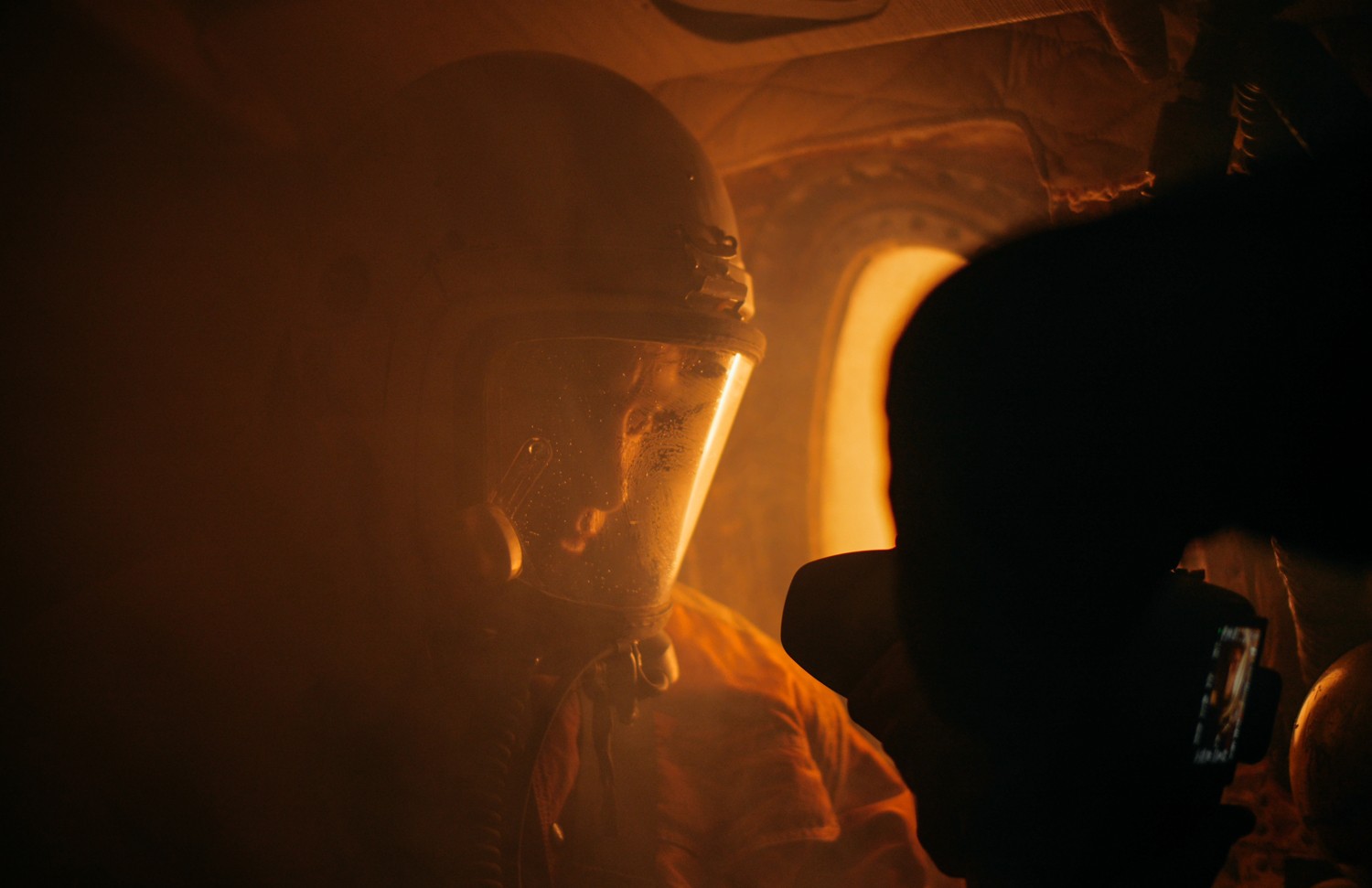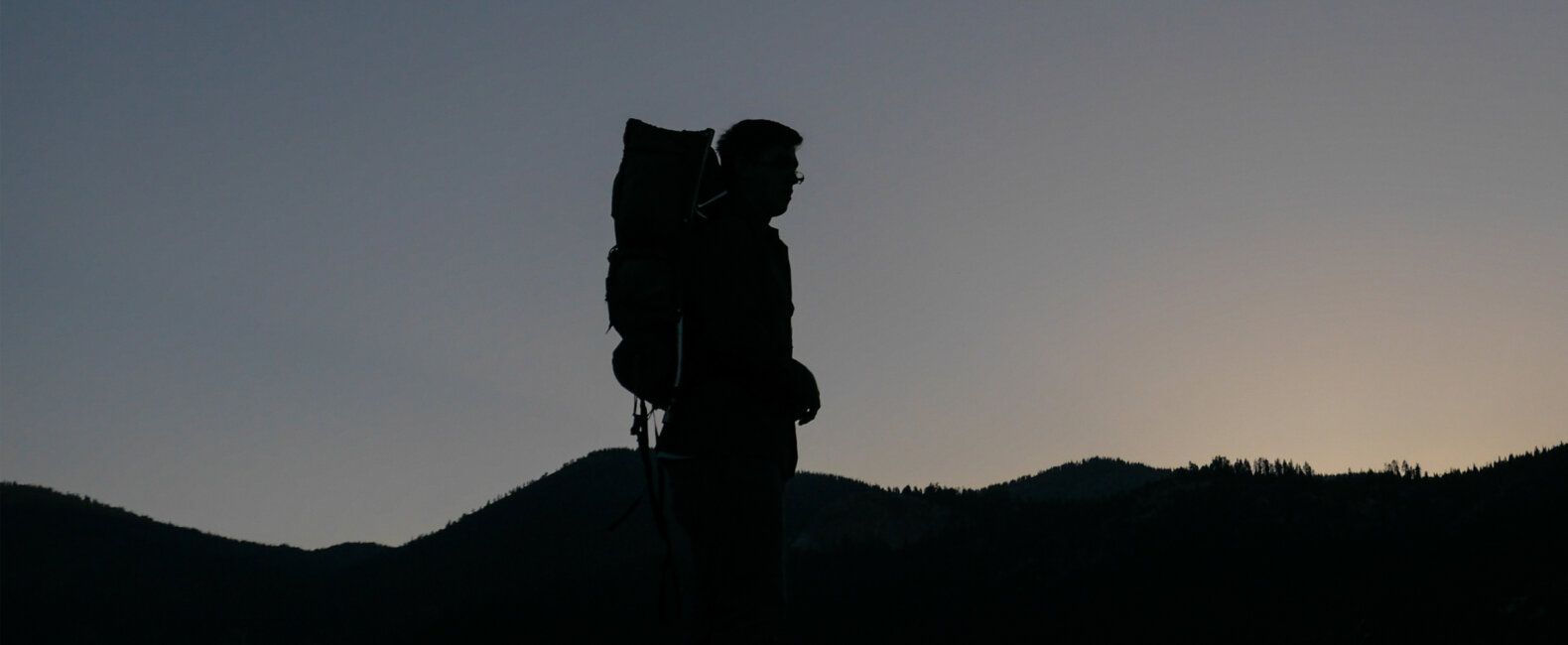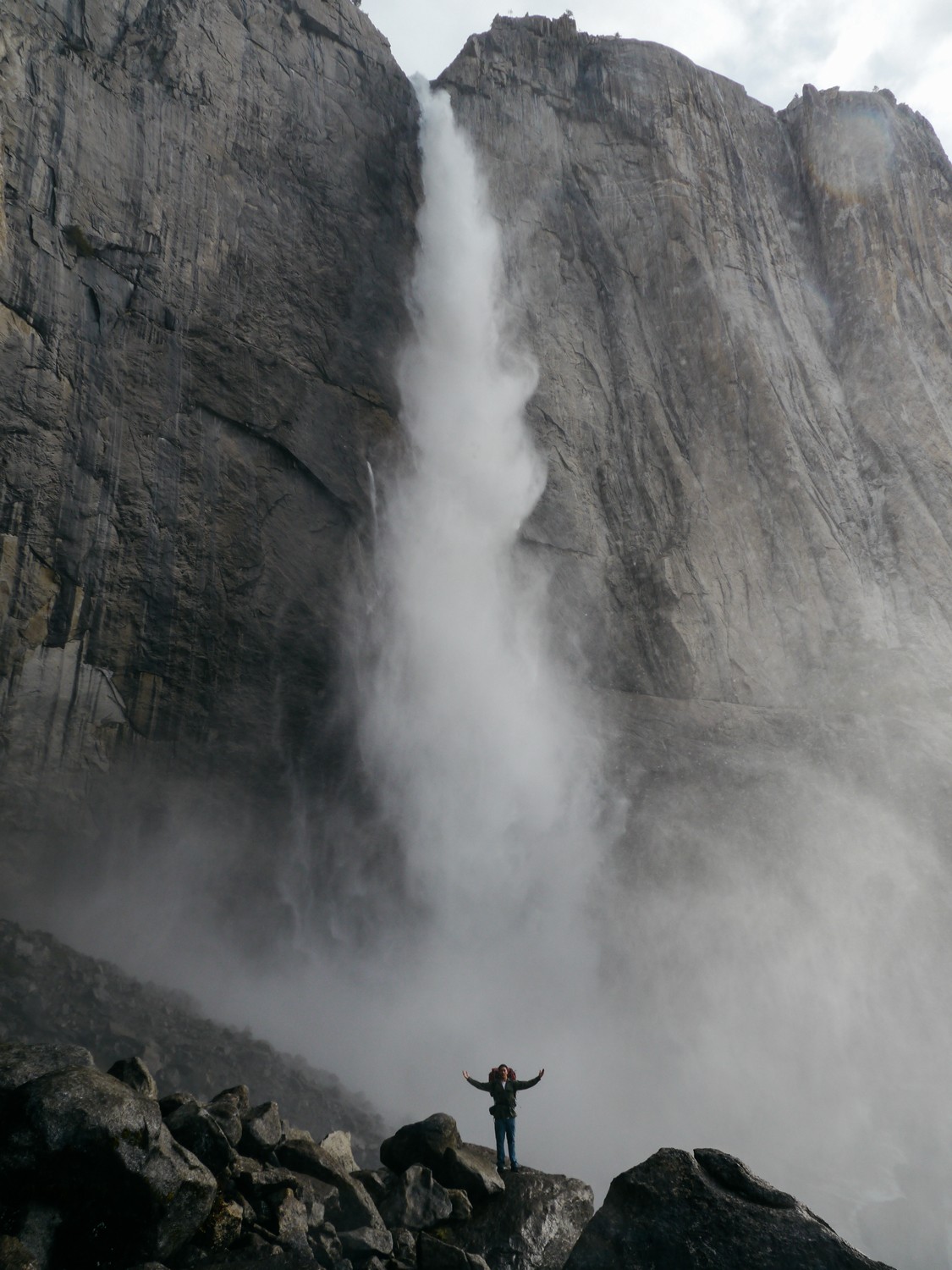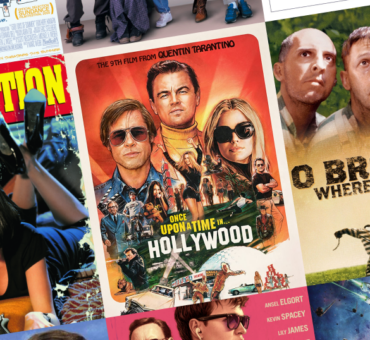It may have started as a film school assignment, but the short film AWAY quickly became a film school in itself for Zach Zombek (a.k.a. Convolv). Over the course of its three-year production, the demands of the film forced Zach to master everything from cinematography to visual effects to scoring. “That’s one reason we kept the team so small,” Zach told us. “It forced me to learn these things instead of having someone else do them for me.”
And learn Zach did. The film is beautiful. So is the score. In fact, Zach is now one of Musicbed’s exclusive artists. But the film didn’t just inspire technical maturity. It inspired personal maturity as well. That’s one of the reasons the film took three years to finish. During production, Zach and his co-producer, Anthony Gomez, grew up. It wasn’t until the very end that they understood what they were making — or why.
We recently spoke with Zach and Anthony about their three-year journey, mail-order spaceships, and the importance of putting yourself into everything you do.
Musicbed: How did you guys meet?
Zach Zombek: After I graduated from high school, I was part of this program called FilmEd Academy of the Arts. It’s a film program where they provide the cameras and the teaching and all of that good stuff. Anthony was in the program too, so we started carpooling. That’s how we became friends. At the end of the school year, I was looking for actors who could commit to a long-term project. So I asked Anthony if he’d be interested in acting in my film.
And that film was AWAY?
Zach: Yeah. AWAY. That film has definitely been at the center of our friendship for sure.
Anthony, did you always want to get into acting?
Anthony Gomez: Not at all. I was shy in high school. But we had something called Bolt TV, which was the school’s television broadcast, and that’s how I originally got into filmmaking. I filmed football games and got to play with all of the broadcast cameras. I didn’t take it too seriously though. It was just a hobby. Then during my senior year, when we finally got FilmEd — and when I met Zach — that’s when I started treating it more like an art form.

You guys are both still in school. Where does filmmaking fit in? Is that what you want to be doing?
Zach: This is definitely what I want to be doing. My current mind-set is to go into something like advertising or documentary work, rather than go down the traditional Hollywood path. I want to work on a smaller scale.
Why not Hollywood?
Zach: The tangible reason would be limited attention spans. Our attention spans these days are so short. I’m guilty of it too. Advertising and short films are a great way to feed that. You watch something and share it, and then more people watch it. They actuallywatch it. If you tell someone to watch a Hollywood movie, it’s a whole process. They have to go home, find the movie, maybe buy the movie, spend two hours watching it, and it’s always hit or miss. Short films are where it’s at for me.
It’s funny that you think you have a short attention span when you spent three years making AWAY.
Zach: [Laughs] Yeah. I honestly don’t know how I got through that. At times I wanted to give up. I was like, “Are people even going to know what this is about or relate to it in any way?” Sometimes I just didn’t have time for it. But I guess I kept going because the film is sort of about my own life.
How did the idea for AWAY come about?
Zach: It all stemmed from an image I had in my mind. I drew it up in Photoshop: a hiker standing on a cliff overlooking the ocean with a rocket behind him. It was this weird, surreal image. This huge contrast between the person and the rocket. And over the past three years, that idea has evolved as I’ve gone through different things and reflected on what those things have meant — what this film has meant — in my life.
It was a process of figuring out what that image meant?
Zach: Exactly. This image stuck out to me. It was like, “Something about this image resonates with my life, resonates with my heart.” The whole time I was making the film, I was getting a better understanding of what it meant.
Can you break down how the three years were spent?
Zach: Well, at first I used the film as a project for my Film 101 class. We started with this core, basic, skeletal idea. We filmed a little bit and then a little bit more and then a little bit more. We didn’t finish it, but I turned in what I had. From then on I was like, “Well, I want to keep going with this idea.” So over the course of the first year, we kept filming and then, as I learned about lighting and cinematography, I realized none of it looked good. So we went back and refilmed.
Anthony: It looked terrible.
Zach: I wasn’t aware of some really basic things that make a shot look beautiful. For example, we were filming in the high afternoon.
Anthony: We had a very immature approach that first year. We started looking at the footage and realized how much more we needed to put into it to make it good. It forced us to mature, to make something better than we’d ever made before.
Zach: So yeah, that was the first year. We filmed in my house for the first scene, and we went to Sequoia National Park. The footage in my house is the only footage we kept. We refilmed everything else. The scene where he’s walking through the city — at first, we filmed that just down the street from my house. But then I realized I could make it so much better. So we went to L.A. and filmed in the city. Then we went out to the sequoias and ended up scrapping all the footage. But like Anthony said, that’s how we matured. My knowledge matured.
Anthony: The first year was spent getting our feet wet. During the second year, the aesthetics were really formed. And then the story was formed the most during the last half of the second year and the beginning of the third year, which is definitely unorthodox.
Zach: Over the course of three years, we basically made the film twice. It was a huge learning process for me. I think it was for Anthony too.
Anthony: A big thing we learned was to set deadlines. We decided we’d premiere it on a specific day — even if it wasn’t finished — and that pushed us to finally finish the film. We were up 20 hours a day for a week straight.
How did the story evolve?
Zach: Like Anthony said, it really started forming during the last year. The way I understand it now is that the story is about the farthest a human can get from the world. That’s what the rocket represents. Originally, though, the story didn’t have much heart behind it. But as I matured, the story did too. I had this notebook I kept with me, and I wrote down things my pastor said, things my friends said, things I thought about. I wrote down anything that spoke to me, and then I started organizing them into the script. So, really, the film became a visual representation of my life. I became enveloped in it. All of a sudden, things started coming together. You have this mess of a project and somehow it comes together. It forms into something that resonates with you — and hopefully with other people. There’s no particular science behind it or an explanation for it. It just happens.
Anthony, did you realize you were signing on for a three-year project?
Anthony: We both agreed it was going to be a long process, but we weren’t ready for three years. I was going through a lot in my life while we were making this film. School stuff and personal stuff. When we’d go on these trips to film, it was kind of like a vacation for me. It was a lot of fun. It was a way for me to get away from reality and focus on something else. The transformation shown in the film reflects my personal transformation. I don’t know if you noticed, but I’m about 40 pounds heavier at the beginning of the film than I am at the end. I was transforming as much as the film was.
Zach: Same for me. The thing is, I haven’t gone through very much. I feel like my story is pretty basic. So this movie is about me telling my story, which might seem trivial to other people, but I’m putting it out there that this is how I was feeling at a certain time in my life. I believe we all have our own story that’s just as important as anyone else’s. Every person has an incredible story, no matter how nondramatic it seems. Putting those small, nondramatic feelings on screen has been huge for me.
But, I mean, there’s a rocket ship in the film.
Zach: Yeah, but I guess that’s what I wanted to portray. I’m showing people the way these small things feel in my life.
I became enveloped in it. All of a sudden, things started coming together. You have this mess of a project and somehow it comes together.
The effects in the film are pretty spectacular. Did you know you could pull them off when you started making the film?
Zach: Not at all. But part of what drove me forward was my desire to learn. I wanted to learn the software. I wanted to learn how to make these things. The whole visual effects process, for me, is about learning. Learning specific skills on a need-to-know basis. That’s one reason we kept the team so small. It forced me to learn these things instead of having someone else do them for me.
How did you do the rocket?
Zach: The rocket is actually a model. It’s this vintage model rocket that I found online. I built it and painted it, and it looked terrible. So I bought another one and sent it to this painting company. I told them exactly what I wanted. They were really cool, but it was expensive. I got it back and I tried lighting it on a blue screen in my room and then on a green screen outside. I hung it with fishing wire.
Anthony: Trying to get the spin right.
Zach: Yeah, trying to get the spin right. One time I put a light too close to it, and one of the boosters melted. I had to use one of the boosters from the old model to replace it. It was unorthodox and time-consuming, but it worked out. I definitely think that for me to do visual effects well, I have to be super passionate about it. I have to be super passionate about the project. Otherwise, it’s not going to look good.
You have to be obsessed with it.
Zach: Exactly. Visual effects are just a lot of experimentation and that takes time. Obviously, once you’ve had experience with certain things, it goes faster. If anyone ever asks me to create a rocket now, I’ll be like, “No problem. Here you go.”
What was it like getting a Vimeo Staff Pick?
Zach: I don’t know about Anthony, but I still had a lot of insecurities about what people would think about the film. We premiered it in a theater, but the audience was mainly our friends and family. They don’t always give very —
Anthony: — constructive feedback.
Zach: Constructive feedback. They’re always going to say, “Great film. Loved the cinematography.” So when I put the film online, I was insecure. But my expectations were totally shattered. It was such an honor to get a Staff Pick.
Anthony: I had higher expectations for the film than Zach did. We’d put in so much work and the effects were so good and the overall quality was on a different level than we were used to. I thought it was going to do well. I really did.
What lessons have you guys taken away from your three years of working on this?
Zach: The biggest thing I learned from this film is how important it is to include experiences and lessons from your own life. When it’s close to your heart, you’re going to be passionate about it. You’ll know better what you’re doing — and why you’re doing it. When we started this film, I didn’t know a lot of that. I didn’t know why this idea stuck out to me. But as I matured, I figured out why I was doing this and why I was passionate about it and what it meant to my life. That was a huge lesson.
Anthony: I’ll second that. As a filmmaker, you have all of these great ideas, but you have to search for yourself inside of the idea. You have to make it hit close to home for you. You have to make it so that if you don’t finish this thing, it’s going to bother you. I think that translates onto the screen. I think viewers see that in the film.

There’s no better film school than simply making films. Every film is an education within itself. So the lesson here, we guess, is to dive in. To figure things out as you go. It’ll probably work out. And if not, at least you’ll have learned something. Thanks to Zach and Anthony for talking with us. Be sure to check out Convolv’s tracks, exclusively on Musicbed.





















































































